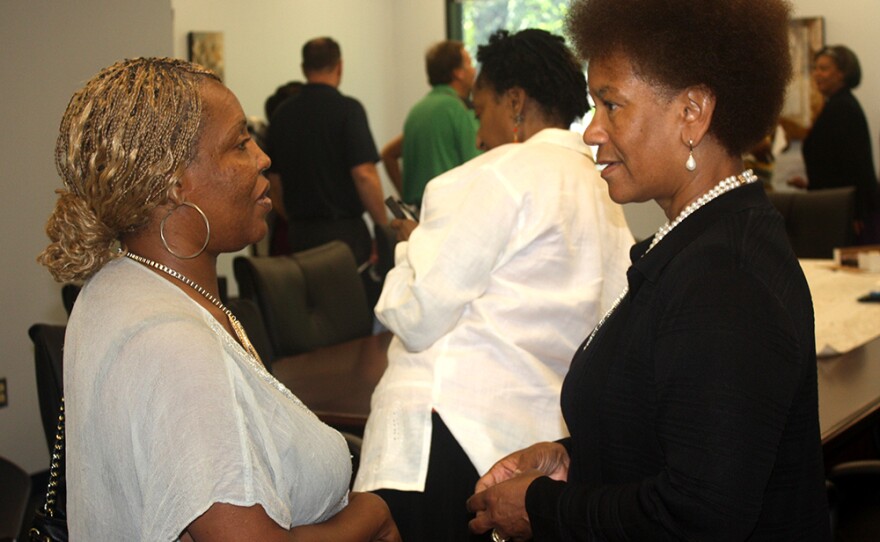When Rosa failed a routine drug test, her probation officer referred her to Support Court instead of jail.
Support courts for defendants with substance abuse issues have existed for over two decades in many states, including Connecticut. They give people an opportunity to seek treatment to avoid the cycle of repeated incarceration. In recent years, federal courts have begun similar programs.
The effort confronts startling statistics that find many federal inmates have addiction issues. Forty percent of them will return to prison within three years of being released.
Rosa, one of the women enrolled in Support Court in Hartford, is pretty open talking about what led her to the program more than nine months ago. "I'm a recovering addict, but I was in federal prison," she said. "I got out of prison in 2011."
Bank fraud is what sent Rosa to prison, but life didn't get easier once she was on the outside. "I remember when I first came home," she said, "and I was doing everything great, and I applied for a job. He called me and said, 'Rosa, unfortunately, we can’t use you, because of your record.' I pulled over on Albany Avenue, and just cried so hard." Months later, she relapsed on cocaine.
When Rosa failed a routine drug test, her probation officer referred her to Support Court instead of jail. The alternative is a one-year program that helps non-violent offenders connect with resources to combat their drug or alcohol addiction.

Support Court participants must attend weekly sessions before a judge, and meet often with a probation officer.
Connecticut's U.S. District Court runs the programs in Bridgeport, New Haven, and Hartford, in collaboration with the U.S. Attorney's office, U.S. Probation, and the federal public defender.
It can be intense. Participants must attend weekly sessions before a judge, meet often with a probation officer, and undergo frequent drug tests that gradually subside only as a participant progresses through the year. There's another side to the program that isn't as formal.
In Hartford recently, a dozen support court participants, a probation officer, even the federal judge, spent time together outside the courtroom. They met at Elizabeth Park. They were going to tour the governor’s mansion, but that didn't go as planned. They were turned away at the door after being told they didn't have a reservation.
Bonita Keays, a federal probation officer, turned the scheduling snafu into a lesson for the group as they walked away. "Did anyone feel offended, or hurt, or anything like that?" she asked the group. No one did. "What have you learned?" she asked.
"Take two steps back," said one participant. "Keep my composure," said another.
"There you go," Keays said. "That’s what we’re looking for. Composure."

Some Support Court participants have served time in federal prison, and are in the program after an alleged violation of their supervised release. Others are defendants who pled guilty and are awaiting sentencing, or who are considered pre-trial. Participants who complete the program earn time off supervised release.
"For many participants, this is the first time anyone in a position of authority has demonstrated a sincere concern for their well-being."
Stefan Underhill
U.S. District Judge Stefan Underhill brought the idea of federal support court to Connecticut after hearing about a similar program in Oregon. "I had been a judge long enough," he said, "that I had become frustrated with the revolving door."
Underhill said it’s hard for anyone to overcome drug addiction, especially if he or she returns after prison to the same environment that encouraged substance abuse and criminal behavior.
Part of the goal of Support Court is to show people they can turn around their lives without committing crimes. A personal relationship develops between the judge and the participants -- a completely different side to what people think of as the criminal justice system, Underhill said. "For many participants," he said, "this is the first time anyone in a position of authority has demonstrated a sincere concern for their well-being."

Since 2010, about 57 percent of participants in Connecticut have graduated from the Support Court program. Even so, it doesn't mean they will never abuse drugs or alcohol again, or not be re-arrested.
U.S. District Judge Vanessa Bryant, who oversees the Hartford program, said some have failed, but they're still learning skills that could help them in the future. "Everyone is redeemable," she said. "It’s a matter of trying to find that portal to reach that person."
Giving people another chance also makes economic sense. Deirdre Daly, Connecticut's U.S. attorney, said federal prisons are 40 percent above capacity. "About 50 percent of folks that are in prison are in narcotics offenses," she said. "Many of those are also abusers. This is not a sustainable model."
That's part of the reason Daly said the feds have embraced Support Court under U.S. Attorney General Eric Holder. It's an about-face from several years ago, when the Department of Justice said in a report to Congress that drug courts were better suited in state criminal justice systems, as federal drug cases often involved more violent offenders.
Daly said they've been able to identify non-violent federal offenders who can benefit from an alternative program to combat high rates of incarceration and recidivism. "Federal prosecutors cannot just be case processors," she said. "They must focus on improving the quality of life for communities, and issues of re-entry."
Rosa, who is continuing her recovery from drug addiction, said Support Court has helped her appreciate what life still has to offer. "All these things I'm accomplishing -- this is my first time doing it on my own," she said, "working for it. It's a wonderful feeling. It really is."
Rosa has just a few more months left before she completes Support Court. She said she's not letting her prior felony impact her job prospects anymore: she has plans to open up her own business.







